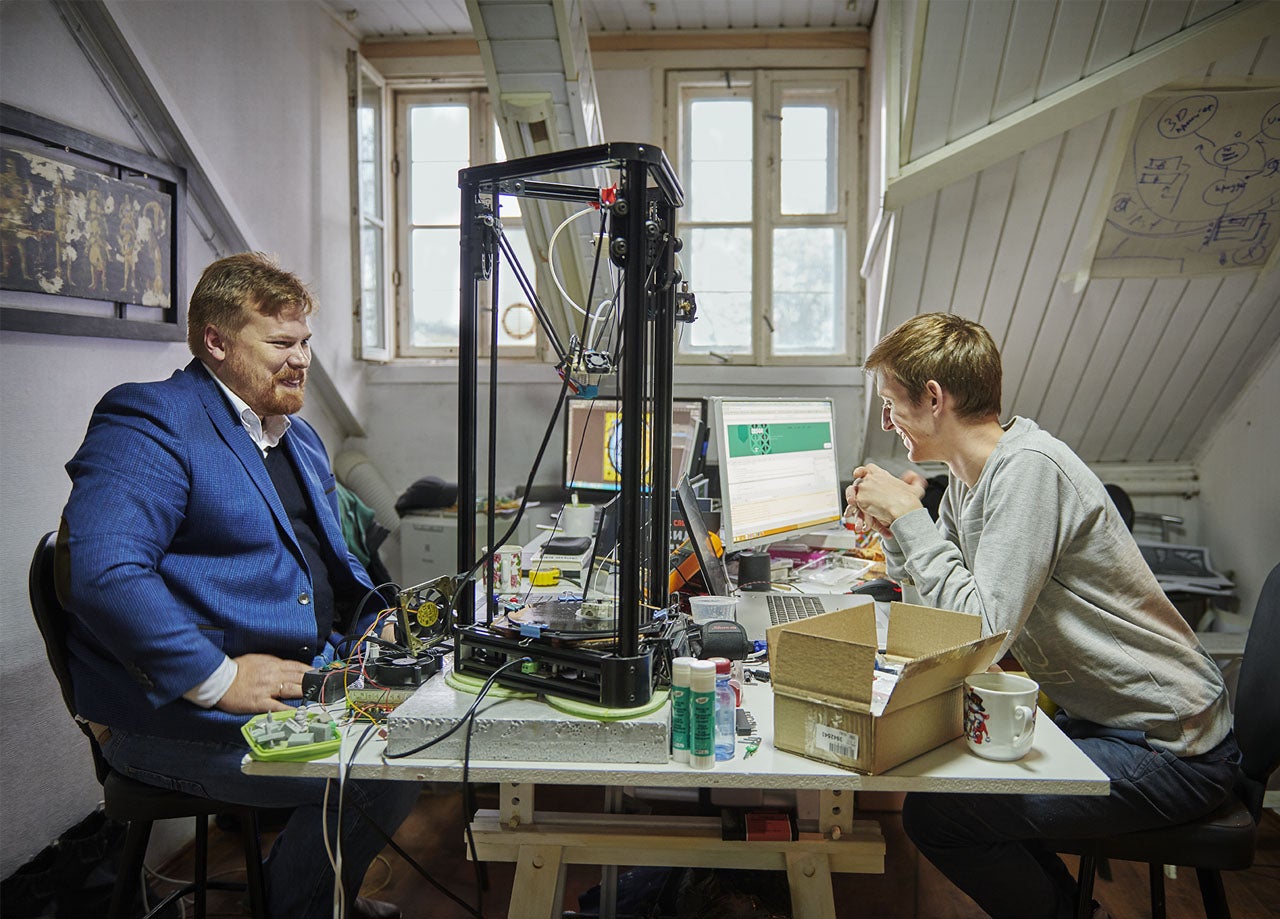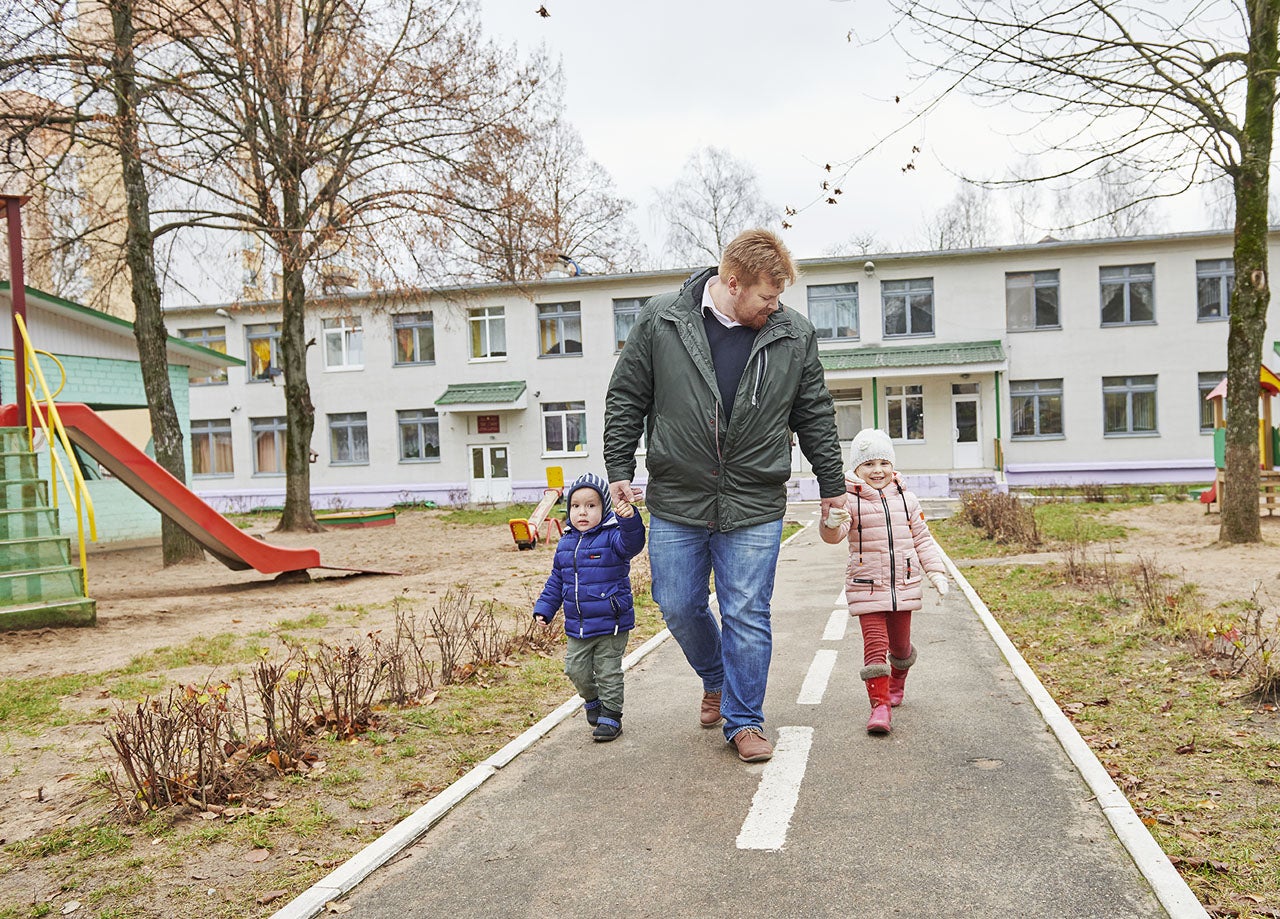He is a big, grinning bear of a man from a country where, it is said, no one smiles. He applied for a prestigious leadership development program at Arizona State University’s McCain Institute for International Leadership even though “leader” is a dirty word in his country, and “character-driven leadership,” which the program touts, is untranslatable nonsense.
But in early 2017, Yaroslav Bekish was looking for a change. He had made his mark in Belarus leading the Green Network, which works on democracy campaigns, climate change initiatives, and access to justice. “We managed to change legislation,” he says. “It is absolutely impossible in Belarus, but we did it anyway.”
His wife, Anastasia, was part of the country’s official delegation at the 2015 Paris Climate Change Conference. But in some ways, Bekish’s work felt futile.
“I got the feeling that we can win some fights,” he explains, “but we couldn’t change the situation significantly.” Seeking new tools, he applied for the McCain Institute’s Next Generation Leaders (NGL) program.
He was among eight 2017-2018 fellows selected from nearly 1,200 applicants around the globe. His year as a McCain NGL was life-changing, though the results were different than anything he could have predicted. Some of the lessons, it turned out, would come from unexpected places. Like small towns. And even playgrounds.
Yaroslav Bekish (left) works on data-driven solutions to human problems in his native Belarus, including environmental and governmental issues. Photos by Darran Rees
THE INSTITUTE PAIRS each fellow with an organization where they’ll spend most of the year, and Bekish would work in the Kansas City, Missouri, mayor’s office. He studied city programs and priorities; he read up on city leaders, city business, city life. He connected with green organizations in the region — more than a dozen — wanting, as he put it, “to be active and to know everything.” Looking back, he allows a chuckle.
Bekish was Kansas City’s third McCain Institute fellow, so they knew the deal.
“You’re literally getting a world-class expert in your community to do something about which they’re passionate,” said Bob Bennett, the city’s chief innovation officer, in whose department Bekish worked. In Bennett’s view, city governments are perfect matches for the McCain Institute, which calls itself not a think tank but a “do tank.”
“We’re practical entities,” Bennett said of cities. “We have to be responsive; we have to get stuff done.”
For Bekish, it “was like going to Mars.”
A LANDLOCKED COUNTRY in Eastern Europe, Belarus won its independence from the Soviet Union in 1991. In 1994, Alexander Lukashenko became the country’s first directly elected president, and he has been there ever since. The CIA labels him a dictator. The country remains economically dependent on Russia even today.
Average income is the equivalent of about $500 a month. Most of the country’s industry is government-run, making it unattractive for foreign investment.
The people feel powerless, according to Bekish. Sure, you may choose what to eat, what to wear, how to furnish your apartment. But you cannot freely choose your leaders. You don’t get a voice in public process. You can’t learn how government funds are spent.
But Next Generation Leaders often come from regions where the path isn’t easy, according to Ambassador Michael C. Polt, who joined the McCain Institute after a 35-year career as a U.S. diplomat. The idea is, giving the right leader the right boost can catalyze change anywhere.
But even Polt and Gen. Ben Freakley, professor of practice of leadership for ASU who mentors the participants, were taken aback during an orientation session introducing NGLs to American notions of shared values. “What are your country’s values?” they asked the group. NGLs from Haiti and Kyrgyzstan and Germany and so on shared their ideas. Then came Bekish.
“My country has no shared national values,” he pronounced. Forget things like freedom, independence and country, he said. Instead, in surveys, Belarussians say their highest value is family, yet as Bekish explained, they have high divorce rates. They say they value health, yet rates of alcoholism and suicide are staggering. They say they value stability, yet they have high levels of mistrust in authority. Finally, Bekish wondered: Do universal values even exist?
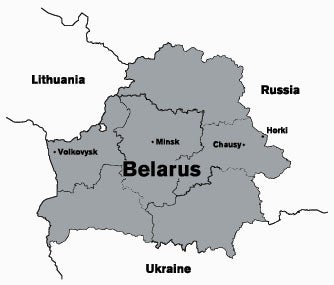
Yaroslav Bekish focuses his efforts on four areas of Belarus, a nondemocratic nation located between the European Union and Russia.
As Polt took it all in, he thought, this is going to take time. Also, they had on their hands a very thought-provoking guy.
“He’s always questioning, always wanting to know more,” Polt said.
“It’s fantastic.”
BEKISH KNEW THERE WOULD BE challenges adjusting to his year abroad. His assignment in the Kansas City mayor’s office was completely foreign territory. In Belarus, local governments bend to the rulers in the capital, Minsk, with no real autonomy.
Bekish wanted to understand this new world — this life on Mars. He pored over the city budget. Ideas bounced around his head. He and the other NGLs had been instructed to play an active role in their assigned posts, both demonstrating and developing leadership skills. So, in his first week on the job, he made a presentation to his new colleagues.
“I said, ‘I have a plan for you how to be better,’” he recalled. Then he launched into his ideas — “about 1,000 of them!” The assembled group nodded politely. Later, someone explained that, well, half of these ideas had already been implemented, some were barred by legislation and, perhaps, they suggested, you ought to hold off for a bit, anyway.
“They said, ‘It looks like you came to our city with an approach like the city is a clean book, a book without any words and you can write it any way you want,'” he recalled. They went on, “We’ve been writing this book for 200 years already.”
Bekish laughs at this experience. But he didn’t feel shut down. “These people were honest and straight,” he said of his new colleagues in Kansas City.
It was fantastic.
BEKISH RENTED AN APARTMENT outside Kansas City, in Lenexa, Kansas, and in October 2017 Anastasia and their three children — ages 1½, 3½, and 5½ — joined him. They immediately noted contrasts to Belarus.
For one, Anastasia noticed he was speaking differently. What did they do to you, she asked? “I’m trying to think like an American diplomat and speak like an American general,” he explains.
For another, Independence Day in Belarus is marked by tanks rolling through city streets as a show of force. Bekish saw the role of the military was different in American life. He saw how people felt so honored to meet Sen. John McCain, a war hero, that they broke down in tears.
Then there were the Kansas City area parks, which felt like paradise. Back home, the parks were broken down; he has numerous photos of children’s slides with the bottoms falling out and parks filled with parked cars, not children. If people call the government to complain, they face a bureaucratic nightmare and nothing is done. Over time, they lose the will to care.
In Lenexa, “they were the best playgrounds in the world,” Bekish said. Sometimes, he’d see benches with metal plaques saying they had been donated by a local family. In Belarus, Bekish knew, you’d never see that.
One phrase the McCain Institute stresses is, “It doesn’t have to be this way,” Polt says. That means “we can make it better.” Bekish began to see those broken slides in Minsk differently.
Yaroslav Bekish (shown with two of his children) is working with his team on innovations to improve life for his children and future generations in Belarus.
BEKISH HELPED BENNETT work on “Smart Cities” initiatives — data-driven technological innovations that aim to solve human problems. At the time, environmental issues were not included in Bennett’s innovative portfolio, but Bekish came up with a plan. He spoke with other departments, honed his ideas and — this time — when he made his presentation, his colleagues patted him on the back.
“I was the happiest person in Kansas City that day,” he recalled.
After 11 months in the U.S., he returned to Belarus with a plan to bring Smart Cities concepts to Minsk. Bekish organized a conference in September 2018 and figured that once officials learned how technological innovations improved big-city life and saved money, they would be sold. Bennett joined the conference to talk about best practices. But to Bekish’s great disappointment, official Minsk just wasn’t interested.
Then, something odd happene. He began hearing from small towns that wanted to know: How can we serve our citizens better? How can we reinvigorate our economies?
“The small cities in Belarus are bankrupt,” Bekish explains. “These regions are dying. Youth leave and just go to Minsk. With this level of depression, they’re ready to talk to us.” They were so far outside the orbit of Minsk, officials didn’t pay them any attention.
“I would never have expected little cities would be so open,” Bekish says. “I realized I was wrong about the target.” He’d use his leadership skills where they were both wanted and desperately needed.
WHEN BEKISH BEGAN the program, his goal was to establish a successful, independent, civil society in Belarus. This is a wonderful goal. It will also take time. He also now sees he was missing a few things. Business, for one. It’s tough to have a thriving civil society with a hopeless economy. What about a business accelerator that would catalyze social projects? He decided he needed some business experience.
He started putting teams together. One is building an augmented reality app for landscape that will allow people to see how the sun will hit and how the plants will look over the seasons and years. It’s relatively simple, he said, and he hopes to make it into a viable business. He plans to use his share of any proceeds to fund his civil society work.
Here’s another one: an app to help citizens file government complaints. In Belarus, filing even the simplest complaint is a major ordeal, involving “a huge bureaucratic machine to divide people from authorities.” But maybe, he thought, it didn’t have to be that way.
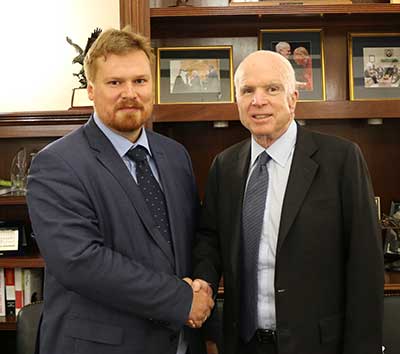
Yaroslav Bekish with Sen. John McCain in 2017, after Bekish earned a Next Generation Leaders fellowship from the McCain Institute.
Broken slides? Illegal parking? What if a citizen could call up a chatbot on their phone, and what if the chatbot could prompt them to describe their complaint? And what if it could generate the properly phrased letter, to the right department, in the required timeframe? And then follow up when the complaint was ignored, delving deeper into the bureaucratic maze, using the proper protocols, until finally, it generated a petition to get the work done? He’s got a team working on that.
“Step by step, we will teach people to talk to officials,” he says.
Belarus, he believes, is stuck in the 20th century. But maybe there’s some advantage there.
“We have people who are hungry for change,” he says. “In the (American) Midwest I would not say it’s the same. In many cases people are relaxed. Everything is fine and we can fix this, but later. People do not push for changes. In Belarus, I can feel that people want something different.”
A maverick in the John McCain tradition, Bekish wants to help lead the way there.
Written by Maureen O’Hagan. O’Hagan is an award-winning freelance journalist who covered an array of subjects as a staff writer for The Washington Post and Seattle Times. She has been a finalist for the Pulitzer Prize in Public Service.
This story originally appeared in the winter issue of ASU Thrive magazine.
More Law, journalism and politics
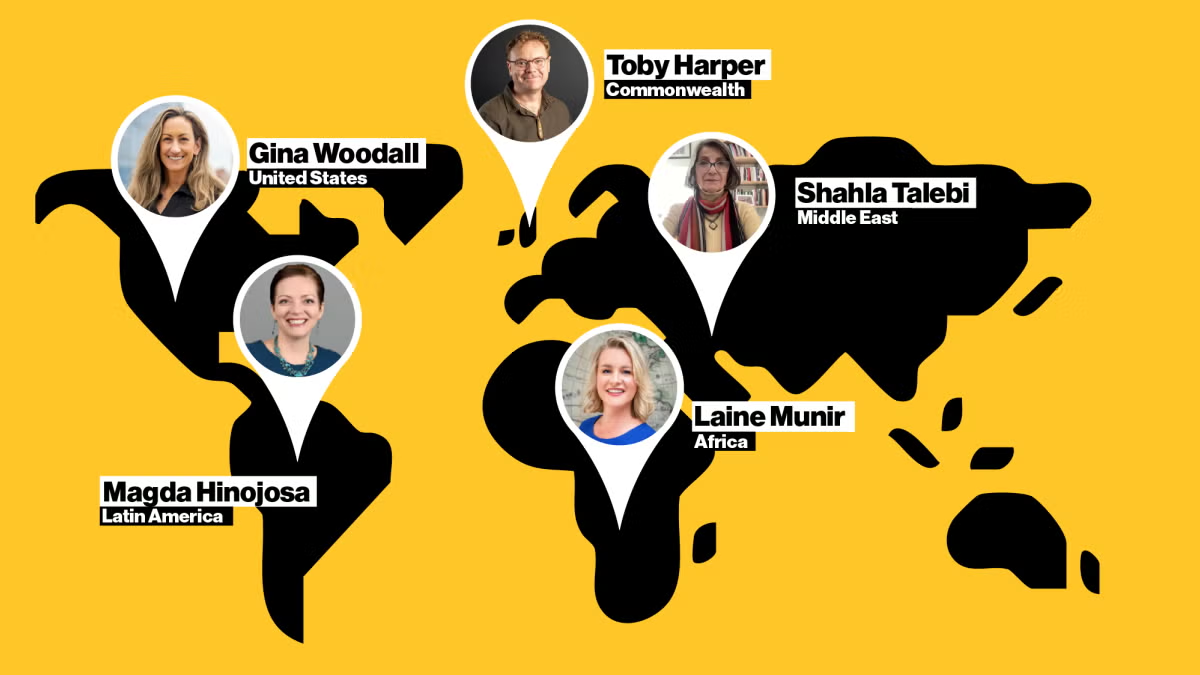
ASU experts share insights on gender equality across the globe
International Women’s Day has its roots in the American labor movement. In 1908, 15,000 women in New York City marched to protest against dangerous working conditions, better pay and the right to…

ASU Law to offer its JD part time and online, addressing critical legal shortages and public service
The Sandra Day O’Connor College of Law at Arizona State University, ranked 15th among the nation’s top public law schools, announced today a new part-time and fully online option for its juris doctor…

ASU launches nonpartisan Institute of Politics to inspire future public service leaders
Former Republican presidential nominee and Arizona native Barry Goldwater once wrote, "We have forgotten that a society progresses only to the extent that it produces leaders that are capable of…



